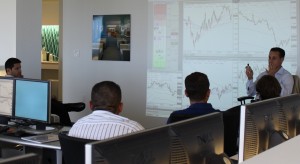When it comes to learning Forex trading in the currency markets, there are two basic ways to achieve this. One is to create a dummy practice account offered by most brokerages as a tutorial on Forex trading, and the other is to create a real account, start trading and learning Forex form experience – either yours or that of any experts you can find. Now, considering that you may need to open a real account eventually, in order to start trading and make some real money, this may or may not be the ideal way to learn things as the losses you incur will also be real.
Learning Forex from practice / demo accounts
There are many tutorials on how to learn to trade Forex, and frankly speaking, this is not one of them. This is a comparison between two separate ways of learning Forex trading. Now, as far as Forex trading goes, these simulators are as realistic as it gets. The feeling is not quite the same, naturally, and any profits and losses are virtual, meaning if you wanted to go crazy with the odds and see how that plays out, it’s better for everyone to do it here. It’s better for you, that much is certain.
Learning Forex form real life
The biggest issue is not whether to learn through trial and error on the real market (you will definitely have to do it eventually), but how to minimize any potential losses when you do it. Since they are aware this day would have to come, many traders simply choose to skip the tutorial and get straight to business. One way to compromise between the two ways, one of which offers no actual experience and the other offering potential bankruptcy, is to use an “expert advisor”, which is usually little more than an euphemism for Forex robots. Or, it could be a real person, sending you trading signals, but this is not as common as you might think.
eventually), but how to minimize any potential losses when you do it. Since they are aware this day would have to come, many traders simply choose to skip the tutorial and get straight to business. One way to compromise between the two ways, one of which offers no actual experience and the other offering potential bankruptcy, is to use an “expert advisor”, which is usually little more than an euphemism for Forex robots. Or, it could be a real person, sending you trading signals, but this is not as common as you might think.
Expert advisors
Learning Forex from expert advisor means taking hints on Forex trading from either a piece of software or an actual person (or both). There is no rule that you can’t do this on practice accounts, but even people who did fine on their own during these simulations usually resort to expert advisors once they enter the real market. Some even get lazy and resort to “copy trading”, a practice when you match someone else’s trades to the letter and share their fate – if they lose, you lose and vice versa. But then you’re not really the one trading, are you? Plus you need to account for slippage, i.e. the lag between expert’s actions and you becoming aware of them. If anything happens, he is not going to warn you first, he is going to save his money. If you catch on in time, great, if not, well… You’re on your own.
Having said that, learning from experts in real life does have its merits. Not only do you get to learn things first hand, you’ll make actual money doing it. Just be careful.
